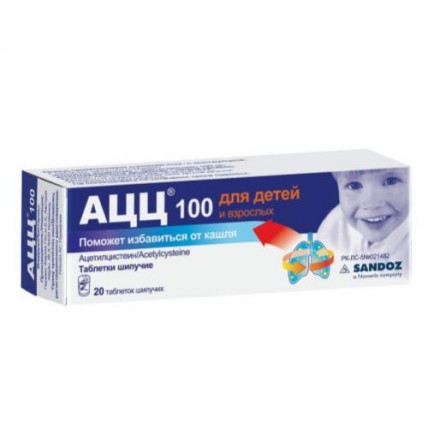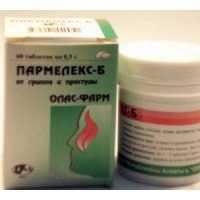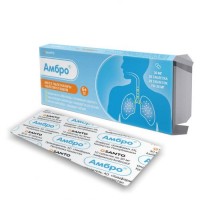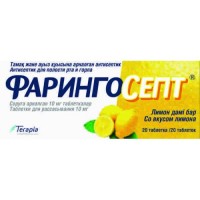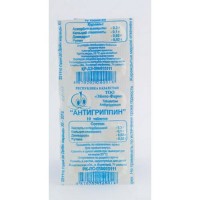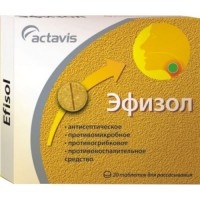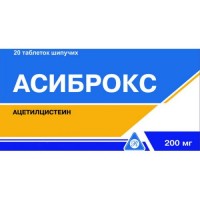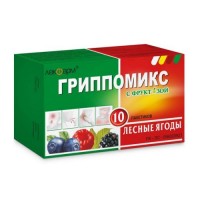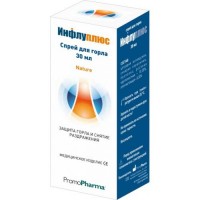ACC® 20s 100 mg effervescent tablet for children
- $10.70
The instruction for medical use of AЦЦ® 100 medicine the Trade name of AЦЦ® 100 the International unlicensed name Acetylcysteinum Dosage Form Sparkling tablets of 100 mg Structure One sparkling tablet contains active agent: Acetylcysteinum of 100 mg, excipients: anhydrous citric acid, Natrii hydrocarbonas, sodium a carbonate anhydrous, Mannitolum, lactose anhydrous, ascorbic acid, sodium citrate, sodium saccharin, fragrance blackberry In. The description of the Tablet of round shape, white color, with a smell of blackberry, perhaps slightly sulfate, with a diameter about 18 mm. The prepared solution - transparent or with easy opalescence, colourless, without mechanical inclusions. Pharmacotherapeutic group Drugs for elimination of symptoms of cold and cough. Expectorant drugs. Mucolytics. Acetylcysteinum. The ATX R05 CB01 code the Pharmacological Pharmacokinetics Later properties of intake Acetylcysteinum is quickly absorbed from the digestive tract (DT) and metabolized in a liver in cysteine, pharmacological an active metabolite and also in diacetylcysteinum, cystine and various mixed disulfides. Because of high effect of the first passing through a liver, bioavailability of Acetylcysteinum very low (about 10%). At the person the maximum concentration in plasma are reached in 1-3 h. The maximum concentration in plasma of a metabolite of cysteine makes about 2 µmol/l. Linking of Acetylcysteinum with proteins of plasma makes about 50%. Acetylcysteinum is removed through kidneys almost only in the form of inactive metabolites (inorganic sulfates, diacetylcysteinum). The removal period in plasma is about 1 hour and generally is defined by hepatic biotransformation. Therefore the abnormal liver function leads to lengthening of elimination half-life up to 8 hours. The pharmacodynamics Acetylcysteinum breaks disulfide bridges between mukopolisakharidny chains. Thanks to this mechanism the viscosity of a phlegm decreases, its removal improves, desires to cough are reduced at the expense of what ventilation improves. Indications - sekretolitichesky therapy in acute and chronic diseases of bronchial tubes and lungs, the formations which are followed by disturbance and removal of a phlegm. A route of administration and a dosage Adults and teenagers aged from 14 years: On 2 sparkling tablets 2-3 times a day (400-600 mg of Acetylcysteinum a day are equivalent). Children and teenagers aged from 6 up to 14 years: On 1 sparkling tablet 3-4 times a day (300-400 mg of Acetylcysteinum a day are equivalent). Children aged from 2 up to 6 years: On 1 sparkling tablet 2-3 times a day (200-300 mg of Acetylcysteinum a day are equivalent). Duration of treatment depends on a disease and its weight and has to be defined by the attending physician. Sparkling tablets dissolve previously in a glass of liquid (water, tea or juice), accept after a meal. The prepared solution has to be accepted immediately. Densely close a container after extraction of tablets! Side effects not often (≥1/1000, & lt, 1/100) - allergic reactions (itching, urticaria, skin rash, a bronchospasm, a Quincke's edema) - tachycardia - arterial hypotension - a headache - fever - stomatitis, an abdominal pain, diarrhea, vomiting, heartburn and nausea - sonitus - a rhinorrhea Seldom (≥1/10000, & lt, 1/1000) - an asthma, a bronchospasm (mainly at patients with hyperreactivity of the bronchial system connected with bronchial asthma) - drowsiness - the spasm, with a possible lethal outcome, in case of overdose Very seldom (& lt, 1/10,000) - the anemia, hemorrhages which are partially connected with hypersensitivity reactions - anaphylactic reactions, up to an acute anaphylaxis - Stephens-Johnson's syndrome or a Lyell's disease - hemopericardium Is unknown - the Contraindication face edema - hypersensitivity to Acetylcysteinum or a component of drug - intolerance of a galactose and lactose - a glucose galactose sprue - a renal failure - a liver failure - children's age up to 2 years - pregnancy and the period of a lactation - pulmonary bleeding, a pneumorrhagia - a peptic ulcer of a stomach and duodenum With care: gullet varicosity, bronchial asthma, diseases of adrenal glands, arterial hypertension. Medicinal interactions Simultaneous use of Acetylcysteinum and antibechics can cause dangerous secretory stagnation owing to reduction of a tussive reflex. This option of combination therapy has to be defined by the attending physician. For achievement of the best therapeutic effect the oral antibiotics (penicillin, tetracyclines and aminoglycosides) have to be entered separately, with a two-hour time interval. Use of activated carbon in high doses can weaken effect of Acetylcysteinum. Simultaneous treatment by nitroglycerine and Acetylcysteinum should be carried out under control of the doctor since strengthening of vasodilating effect and inhibiting effect on aggregation of thrombocytes is possible. Special instructions Special cautions it is required to patients with risk of developing gastrointestinal bleeding (for example, with a round ulcer in an inactive form or varicosity of veins of a gullet) as there are proofs that Acetylcysteinum at intake can cause vomiting. The caution should be taken into consideration also to the patients having bronchial asthma and a hyperreactive bronchial system because of risk of development of a bronchospasm. During use of Acetylcysteinum the development of heavy skin reactions, such as Stephens-Johnson's syndrome and Lyell's disease was seldom or never observed. In case of changes from skin and mucous membranes the patient should stop immediately intake of Acetylcysteinum and to see a doctor. Patients with intolerance of a histamine should accept AЦЦ® 100 short courses, because of influence on metabolism of the histamine possible emergence of symptoms of intolerance (for example, a headache, cold, an itching). Use of an atsetiltsistin can lead to fluidifying of a phlegm in bronchial tubes and to some increase in its volume. At an insufficient tussive reflex it is necessary to carry out: postural drainage or aspiration. One sparkling tablet contains 4.2 mmol (96.0 mg) of sodium. It should be taken into account when prescribing drug to the patients keeping to a diet with the low content of sodium (low-salt diet). Features of influence of medicine on ability to run the vehicle or potentially dangerous mechanisms Drug does not affect ability to run the vehicle or potentially dangerous mechanisms. Overdose Symptoms: nausea, vomiting, diarrhea, is available for children of the first year of life high risk of development of hypersecretion. Treatment: symptomatic. The form of release and packing On 20 tablets place in the tuba from polypropylene corked by a polyethylene stopper with dehumidifier inside. On 1 tuba together with the instruction for medical use in the state and Russian languages put in a pack from cardboard. To Store storage conditions at a temperature not above 25 °C. To store out of children's reach! 2 years not to use a period of storage after expiry date. Prescription status Without prescription the Producer/packer Hermes of Pharm Hess. m b. X, Austria Allgäu 36 A-9400 Wolfsberg, Austria Owner of the registration certificate of Hexal AG, Germany
